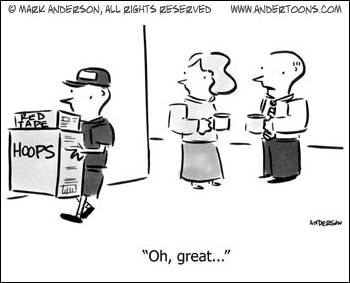July 25, 2016
By: Bobby Casey, Managing Director GWP

Then of course there are the fines and fees for merely trying to eke out a living. Everything from permits to licenses, and the costs for screwing up. In some cases, it looks like local governments are bringing back debtors’ prisons!
Then there’s inflation. That hidden tax that the Keynesians clamor for. It’s when you have a lot of money and can’t afford anything. Government does this through several mechanisms: price fixing, raising the minimum wage, sales taxes, and of course printing more money from the central banks. By devaluing your dollar, they don’t have to physically confiscate it from you.
And then there’s regulations and the cost of compliance. This is the economic death by a thousand cuts. It’s not just one corporate tax or income tax that you know is coming. No. It’s a collection of costs and fees that is ever expanding, changing, and multiplying.
I want to clarify that while I opposed having rulers, that doesn’t mean I oppose rules. Rules are often very helpful. For example, when I’m learning a new language, it’s very helpful to know the basic grammatical rules so that I can make some assumptions when conjugating a verb or pluralizing a noun. Those rules ultimately help me communicate with people and get things done. So no, rules aren’t inherently bad, and I have and follow many of my own.
Rules can facilitate or they can congest and constipate. Rules are guidelines in many cases, not rigid do-or-die conditions. Language is full of exceptions, but that doesn’t negate the rules entirely. I have a moral code that says I should be truthful, but if I could lie and save someone’s life, I’d probably do it.
There is a difference between rules like in grammar that apply to any and all people who choose to utilize a certain language, or rules of physics that apply to any and all who share this physical space, and rules that are not universally applicable and are just contrived control mechanisms. That last one is government regulation.
Here’s a fantastic case and point: wine refrigerators. First off, of ALL the things to regulate, why wine refrigerators? But secondly, wine has been around for thousands of years… I’m pretty sure humans have figured out how to keep it and store it just fine. In fact, I dare say that’s why the wine refrigerator was invented in the first place!
Per the Washington Free Beacon:
“The Department of Energy now has a specific regulation for wine refrigerators.
“The agency released a final rule Friday requiring manufacturers to test the energy efficiency of refrigerators used for wine. It estimated the rule would cost the average small business $12,500 to test whether their equipment meets specifications…
“…The agency said the $12,500 testing cost is ‘unlikely to represent a significant economic impact for small businesses.’”
Oh! Yeah! Small businesses always have $12,500 just lying around in their “Emergency Regulation Compliance Funds”! Especially restaurants that deal in such small margins to begin with, they have nothing better to do than get their wine refrigerators tested for $12,500! They say this as if this were the ONLY regulation they had to pay for.
Imagine yourself a small business operator and needing to pay this sum for equipment you already know is operating fine.
There is a fantastic site called TenThousandCommandments.com. It carries quite possibly one of the most comprehensive collections of information regarding the United States’ regulatory regime. They recently released a 2016 study summing up the US regulations and its economic impact.
(Note: The snapshot is 89 pages long, so I understand if you are busy, reading all this can be a bit much. But there is a two and a half page overview that highlights some very key points. So please, if you get a moment, just check out pages 2 – 4.)
Here are a few take-away points to consider:
- If one assumed that all costs of federal regulation and intervention flowed all the way down to households, U.S. households would “pay” $14,842 annually on average in a regulatory hidden tax.
- That payment amounts to 22 percent of the average income of $66,877 and 28 percent of the expenditure budget of $53,495. The “tax” exceeds every item in the budget except housing. More is “spent” on embedded regulation than on health care, food, transportation, entertainment, apparel, services, and savings.
- The costs of the regulatory hidden tax surpass federal individual and corporate income tax receipts, which total $1.82 trillion combined.
- Regulatory compliance costs exceed 2015 estimated individual income tax revenues of $1.478 trillion.
- Regulatory compliance costs vastly exceed the 2015 estimated U.S. corporate income tax revenues of $341.7 billion.
- The annual outflow of more than 3,400 final rules—sometimes far above that level—means that 94,246 rules have been issued since 1993 when the first edition of Ten Thousand Commandments was published.
Who will regulate the regulators? When the only checks and balances for regulatory agencies is self-reporting, that’s really not much different than cops investigating their own misdoing or a crook investigating their own criminality. Are we shocked that the outcomes are in their favor? In the end, all businesses get screwed, but small businesses are disproportionately screwed over simply because they can’t shoulder the costs. The political class is destroying the entrepreneurial spirit and innovation at every turn. It’s no different than the minimum wage hikes: they are done in the name of helping people, but the truth is they create an even greater barrier to entry for those just starting out such as low skilled workers and small businesses.
Click here to schedule a consultation or here to become a member of our Insider program where you are eligible for free consultations, deep discounts on corporate and trust services, plus a wealth of information on internationalizing your business, wealth and life.

